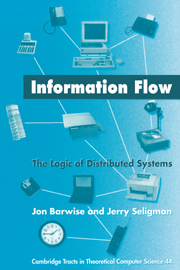Book contents
- Frontmatter
- Contents
- Preface
- Part I Introduction
- Part II Channel Theory
- 4 Classifications and Infomorphisms
- 5 Operations on Classifications
- 6 Distributed Systems
- 7 Boolean Operations and Classifications
- 8 State Spaces
- 9 Regular Theories
- 10 Operations on Theories
- 11 Boolean Operations and Theories
- 12 Local Logics
- 13 Reasoning at a Distance
- 14 Representing Local Logics
- 15 Distributed Logics
- 16 Logics and State Spaces
- Part III Explorations
- Answers to Selected Exercises
- Bibliography
- Glossary of Notation
- Index of Definitions
- Index of Names
12 - Local Logics
Published online by Cambridge University Press: 05 November 2011
- Frontmatter
- Contents
- Preface
- Part I Introduction
- Part II Channel Theory
- 4 Classifications and Infomorphisms
- 5 Operations on Classifications
- 6 Distributed Systems
- 7 Boolean Operations and Classifications
- 8 State Spaces
- 9 Regular Theories
- 10 Operations on Theories
- 11 Boolean Operations and Theories
- 12 Local Logics
- 13 Reasoning at a Distance
- 14 Representing Local Logics
- 15 Distributed Logics
- 16 Logics and State Spaces
- Part III Explorations
- Answers to Selected Exercises
- Bibliography
- Glossary of Notation
- Index of Definitions
- Index of Names
Summary
With the groundwork laid in the preceding lectures, we come to the central material of the book, the idea of a local logic, which will take up the remainder of Part II. In this lecture we introduce local logics and proceed in the lectures that follow to show how local logics are related to channels and so to information flow.
If one is reasoning about a distributed system with components of very different kinds, the components will typically be classified in quite different ways, that is, with quite different types. Along with these different types, it is natural to think of each of the components as having its own logic, expressed in its own system of types. In this way, the distributed system gives rise to a distributed system of local logics. The interactions of the local logics reflect the behavior of the system as a whole.
In order to capture this idea, we introduce and study the notions of “local logic” and “local logic infomorphism” in this lecture. The main notions are introduced in the first two sections and studied throughout this lecture. The important idea of moving a logic along an infomorphism is studied in Lecture 13. In Lecture 14, we show that every local logic can be represented in terms of moving natural logics along binary channels. The idea of moving logics is put to another use in Lecture 15 to define the distributed logic of an information system.
- Type
- Chapter
- Information
- Information FlowThe Logic of Distributed Systems, pp. 149 - 164Publisher: Cambridge University PressPrint publication year: 1997



